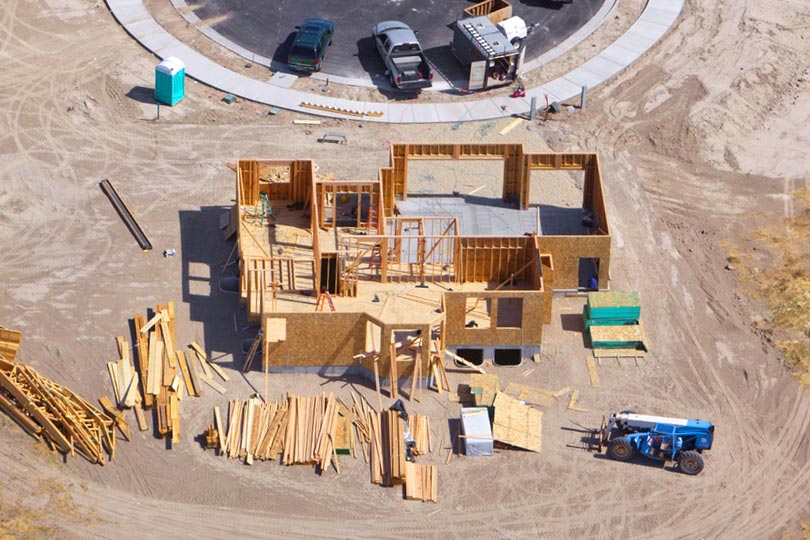Pros And Cons Of Building A Home

Pros And Cons Of Building A Home: Control
When buying someone else’s house, you have no say in the design, layout, or features in the home except for what you might be able to negotiate with the seller in terms of keeping or replacing appliances, etc.
Building a home means working with an architect or design company to select the right floor plan, features, fixtures, countertops, etc. You have more control over the process when using a single-close construction loan to build rather than buying existing construction.
Pros And Cons Of Buying An Existing Home: Down Payments
If you decide to build rather than buy, you will be required to make a minimum down payment. Some borrowers worry about their ability to come up with that down payment and turn to local assistance programs which may provide cash help with down payment and closing costs.
But a One-Time Close lender is likely to require you to come up with your own down payment to build a home--you likely won’t be able to use down payment assistance to build your home.
Pros And Cons Of Building A Home: No Competition
House hunters looking at existing construction in today’s market may find it tough to compete, depending on circumstances, that particular housing market, etc. Some housing markets were so competitive in the summer of 2022 that people were foolishly waiving their right to get a home inspection before purchasing.
You won’t have to worry about such contingencies when building a home.
Pros And Cons Of Buying A Home: Repairs Or Corrections
If you buy existing construction (homes that have been previously owned) you may inherit other people’s problems with the central air conditioning system, electrical system, or other critical areas of the home. When you build a home from the ground up, you are installing all-new appliances, fixtures, features, etc. That is an important aspect to consider if you are on the fence about building or buying.
Want More Information About One-Time Close Loans?
We have done extensive research on the FHA (Federal Housing Administration) and the VA (Department of Veterans Affairs) One-Time Close Construction loan programs.
We have spoken directly to licensed lenders that originate these residential loan types in most states and each company has supplied us with the guidelines for their products. We can connect you with mortgage loan officers who work for lenders that know the product well and have consistently provided quality service.
If you are interested in being contacted by a licensed lender in your area, please send responses to the questions below. All information is treated confidentially.
OneTimeClose.com provides information and connects consumers to qualified One-Time Close lenders to raise awareness about this loan product and to help consumers receive higher-quality service.
We are not paid for endorsing or recommending the lenders or loan originators and do not otherwise benefit from doing so. Consumers should shop for mortgage services and compare their options before agreeing to proceed.
Please note that investor guidelines for the FHA and VA One-Time Close Construction Program only allow for single-family dwellings (1 unit) – and NOT for multi-family units (no duplexes, triplexes or fourplexes).
In addition, the following homes/building styles are not allowed under these programs: Kit Homes, Barndominiums, Log Cabin Homes, Shipping Container Homes, Stilt Homes, Solar (only) or Wind Powered (only) Homes.
Contact Us: Send Us Your Request – Spam Safe
Please send your email request to [email protected] which authorizes OneTimeClose.com to share your personal information with one mortgage lender licensed in your area to contact you.
1. Send your first and last name, e-mail address, and contact telephone number.
2. Tell us the city and state of the proposed property.
3. Tell us your and/or the Co-borrower’s credit profile: Excellent – (680+), Good - (640-679), Fair – (620-639), or Poor- (Below 620). 620 is the minimum qualifying credit score for this product.
4. Are you or your spouse (Co-borrower) eligible veterans? If either of you is an eligible veteran, down payments as low as $0 may be available up to the maximum amount your debt-to-income ratio per VA will allow – there are no maximum loan amounts as per VA guidelines. Most lenders will go up to $1,500,000 and review higher loan amounts on a case-by-case basis. If not, the FHA down payment is 3.5% up to the maximum FHA lending limit for your county.
Do you know what's on your credit report?
Learn what your score means.

April 12, 2024What do we mean by our headline? There are many ways VA and FHA One-Time Close construction loans differ from other types of mortgages, but how do single-close loans differ from each other Each single-close loan program has unique features for the loan's standard features.
April 5, 2024Are you a first-time home buyer? Some assume that just one type of home loan is offered and that getting the right home means filling out a generic credit application. But the reality is that depending on whether you want to build or buy, there are specific mortgage programs, procedures, and terms you should know about before you commit.
March 28, 2024Interested in building a dream home with a One-Time Close construction loan? There are important issues to know about these projects, starting with the fact that you typically are not allowed to act as your own builder and must hire contractors to do the work. Some borrowers must get used to thinking about this, but fortunately, some general guidelines can help them through the process.








